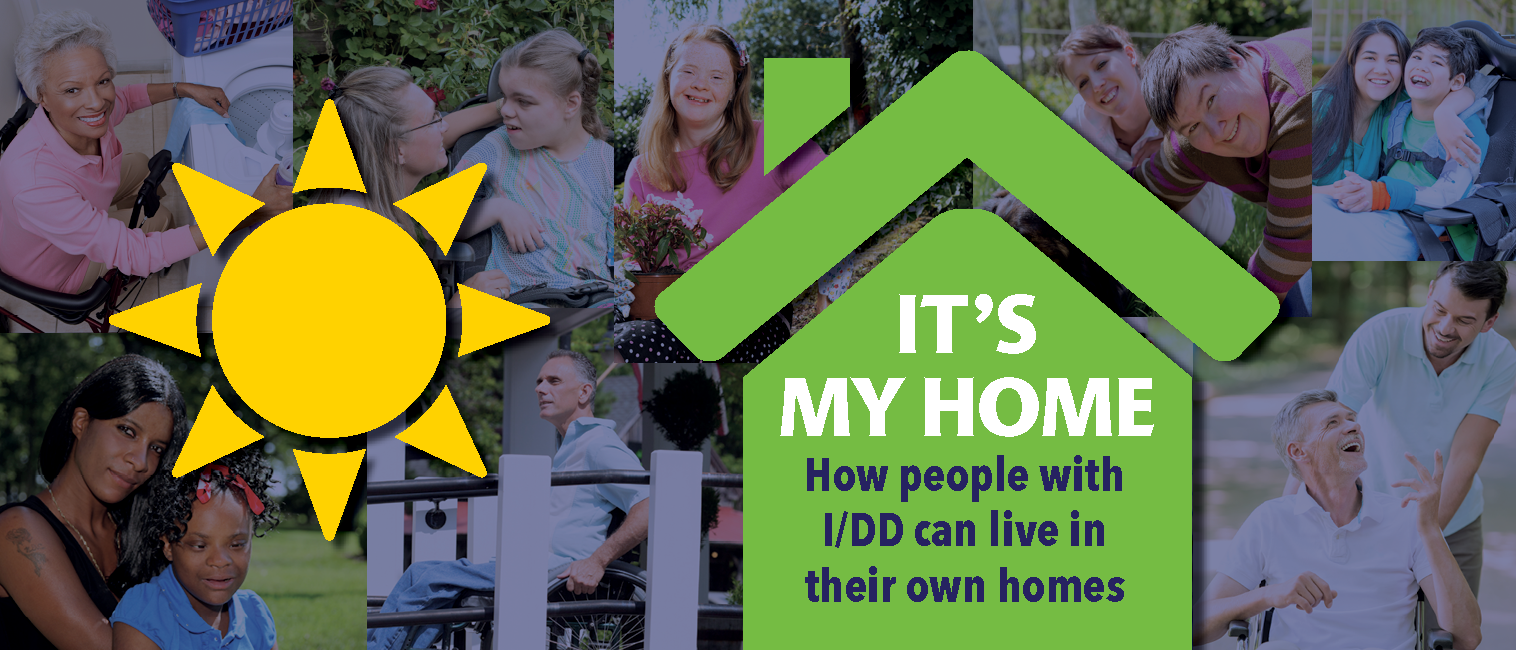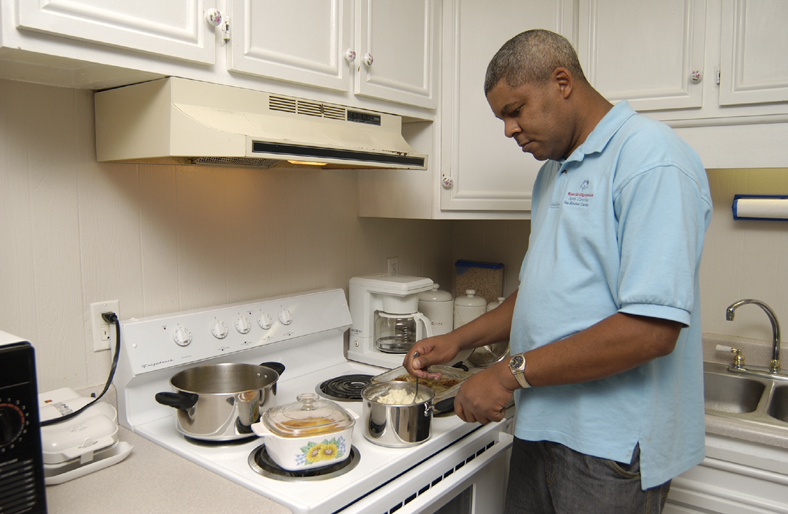Supported Living Guidebook/Resource Manual

“It’s My Home”
NCCDD’s three-year Supported Living: Making the Difference initiative (January 1, 2017-December 31, 2019) set out to promote the new Supported Living Innovations Waiver service that started in North Carolina in 2016 and demonstrate how individuals with intellectual and other developmental disabilities (I/DD) can live in a home of their choice in the community with certain supports.
Over three years, Vaya Health worked with four provider agencies to assist 45 individuals with I/DD in transitioning to homes of their choice in the community. The initiative uncovered many of the challenges that individuals with varying levels of needs face in making a successful transition to living in their own home with support. Working with numerous community partners, Vaya Health compiled all of the learning experiences and lessons learned into this guidebook or resource manual titled “It’s My Home.” In this guidebook, you will find five sections or “buckets” with a wealth of information geared toward different players who are involved in Supported Living below. Click on any one of the five to open and find more details:
+ 1. Foundational Principles
+ 1. Foundational Principles
Why Supported Living?
- View our Supported Living Success Story Videos in the right hand sidebar on this page
- Watch our Lunch & Learn Webinar: Supported Living 101 for more details
What’s the Difference?
- Read Supported Living - The Difference (pdf)
What is Dignity of Experience?
- Read The Dignity of Experience (pdf)
- Watch our Lunch & Learn Webinar: Health vs. Safety & Risk vs. Liability for more details
What is the NC Innovations Waiver?
- Read The NC Innovations Waiver (pdf)
How can I learn more about Person-Centered Thinking?
- Read Person-Centered Thinking (pdf)
- Watch our Lunch & Learn Webinar: Health, Person-centered Living & Individualized Supports: What's the Connection? for more details
How Do I Support People to Make Their Own Choices?
- Read Supporting People in Making Choices (pdf)
- Watch our Lunch & Learn Webinar: Supporting People with Informed Decision Making for more details
How do I get started?
- Read To Get Started (pdf)
What is the future of supports for people with disabilities?
- Read Envisioning the Future of Supports for People with Disabilities by Nancy Weiss (pdf)
- Read Speedbumps and Detours on the Road to Meaningful Inclusion by Nancy Weiss (pdf)
+ 2. Information for People with Disabilities and Their Families
+ 2. Information for People with Disabilities and Their Families
Is Supported Living for me?
- Are you receiving services through the NC Innovations Waiver? Read To Get Started: The NC Innovations Waiver (pdf)
- Watch Lynne Seagle's TEDx Talk in Hampton Roads, VA
- View our Supported Living Success Story Videos in the right hand sidebar on this page
- When a person with disabilities chooses Supported Living, that person and their natural support system must be fully aware of the what to expect. The provider agency that the person chooses should share clear expectations regarding service delivery with the person. First, one of the agencies that participated in the Supported Living: Making the Difference Initiative, has provided this sample document for guidance: Download the Supported Living Consent Sample (pdf)
The Right Fit: Finding and Keeping a Great Direct Support Professional
- Read The Right Fit – Finding a Direct Support Professional (DSP) (pdf)
- Watch Michael Smull's video – Matching Supports
Thinking Through Housing
- Read Thinking Through Housing (pdf)
- Read A Closer Look at Housing Choices (pdf)
- Read Housing Resources (pdf)
What if I want (or need) a roommate??
- Read Roommates (pdf)
What if I have or am a legal guardian??
- When a person with disabilities is interested in receiving services/support in their own home and they have a court appointed guardian, there are often many questions about how the person and their guardian manage the person’s property and tenancy rights. This resource, Supporting People in Making Choices (pdf), provides guidance on these issues.
- Following is a short article written by the mother and guardian of a young woman with disabilities. Her perspectives on guardianship and informed decision making may serve as guidance for you and your guardian. You may access the article here: Guardianship: One Family’s Perspective (pdf)
- Many more resources regarding guardianship are available at this website: http://rethinkingguardianshipnc.org/
+ 3. Information for Direct Support Professionals (DSPs)
+ 3. Information for Direct Support Professionals (DSPs)
The Supported Living Mindset
- Read Supported Living - The Difference (pdf)
Cultivating Community
- Read Cultivating Community (pdf)
Supporting People's Access to Money
- Read Access to Money (pdf)
- Read Setting the Culture (pdf)
The Dignity of Experience
- Read The Dignity of Experience (pdf)
Becoming the Best Direct Support Professional
+ 4. Information for Agencies
+ 4. Information for Agencies
Setting the Culture
- Read Setting the Culture (pdf)
- The Arc of NC, FIRST, Liberty Corner Enterprises, and Turning Point Services are agencies that partnered with Vaya Health during the Supported Living: Making the Difference initiative. Each agency presented a lunch and learn webinar during the 3-year initiative that share the agency’s experience with offering the Supported Living Service.
- Watch our Lunch & Learn Webinar: Provider Experiences with Supported Living (FIRST)
- Watch our Lunch & Learn Webinar: Provider Experiences with Supported Living (Liberty Corner Enterprises)
- Watch our Lunch & Learn Webinar: Provider Experiences with Supported Living (Turning Point Services)
- Watch our Lunch & Learn Webinar: Provider Experiences with Supported Living (The Arc of NC)
Person-Centered Staffing Practices
- Read Supported Living - The Difference (pdf)
- Watch David Pitonyak's video - Jumping into the Chaos of Things
- Watch Michael Smull's video – What is meant by person-centered approaches, thinking and planning?
- Watch our video – What is Person-Centered Planning?
- Watch Michael Smull's video – Person Centered Planning
- Watch Michael Smull's video – Matching Supports
- Read Becoming a Person-Centered System (pdf)
- Read Person-Centered Planning Facilitators Manual (pdf)
- Read Families Planning Together – Starting Work on an Essential Lifestyle Plan (pdf)
Person-Centered Individualized Budgeting
- Read Person-Centered Individualized Budgeting (pdf)
Supporting the Dignity of Experience
- Read The Dignity of Experience (pdf)
- Read Setting the Culture (pdf)
Agency Considerations
+ 5. Other Resources
+ 5. Other Resources
Technology’s Role in Supported Living
- Read Technology & Supported Living (pdf)
Self-Direction & Person-centered Services
- Read The Future of Self-Directed Supports on the web
- Visit the website: The National Center on Advancing Person-Centered Practices and Systems (NCAPPS)
- Read Are We Making Progress by Nancy Weiss (pdf)
- Read Envisioning the Future of Supports for People with Disabilities by Nancy Weiss (pdf)
- Read What Works to Support People Who Have Severe Challenging Behaviors by Nancy Weiss (pdf)
- Read What’s Holding Us Back by Nancy Weiss (pdf)
Public Services
- Fill out the NC Division of Health and Human Services Social Services Contact Form on the web
Housing Resources
- Read Housing Resources (pdf)
- Web resource with additional information about the future of housing: Deciding Where to Live
Crisis Intervention Resources
- Read Crisis Intervention Resources (pdf)
- Read Cultivating Community (pdf)

NCCDD hopes that this information along with the success story videos will enable individuals with I/DD, their families, their support professionals, the agencies they work with, and other community partners to see how to set up Supported Living successfully to make community living a reality for those individuals benefitting from this service. As John O’Brien wrote in 1993, “Supported Living is a simple concept in danger of being complicated until its power to help people with developmental disabilities gets lost.” NCCDD hopes this resource will provide many of the tools needed to understand how to do Supported Living successfully to give those individuals the opportunity to more fully participate in their communities.